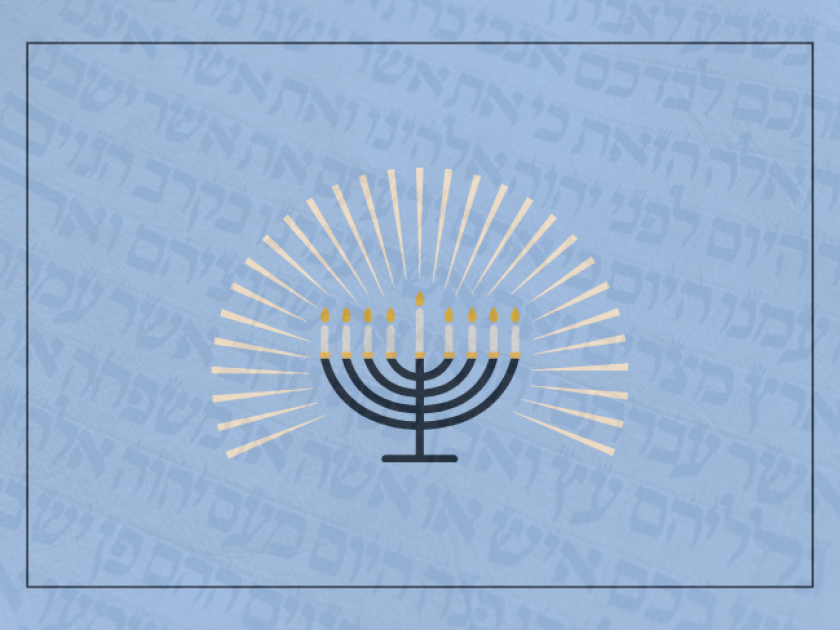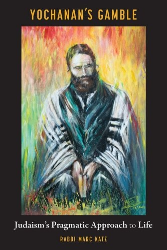
At its core, Judaism is a pragmatic faith. Rather than simply asking what is right, it also asks the broader question, What works? This is just as true in Jewish law, which was modified, molded, and even broken over time to ensure that it wouldn’t cause discord between people or violence against the Jewish community.
But pragmatism doesn’t exist only in law. If a holiday doesn’t “work,” the meanings, rituals, and even central story of that holiday will be changed to fit with current norms. And no holiday is this truer for than Hanukkah.
The original Hanukkah story, told in the Books of the Maccabees, is a story of rebellion. The Greeks are defiling the Temple and bringing their idolatrous practices into ancient Israel, and a small band of Jewish warriors revolts. After winning the war, they reconsecrate their Temple and set up a festival for eight days, which scholars believe is meant to be a substitute for Sukkot, another eight-day holiday they missed while fighting the war.
There shouldn’t be anything wrong with this story. Judaism has plenty of tales, from Passover to Purim, of Jews vanquishing an enemy. But circumstances changed for our ancestors, and the Hanukkah account quickly became problematic. After the Jews defeated the Greeks, they began a short period of self-rule that eventually came to an end when, after internal squabbling, they brought the nascent Roman Empire in to mediate. Rome took one look around and, liking what they saw in ancient Israel, never left. Eventually, the Jews rebelled against Rome. In their effort to quash the uprising, Rome destroyed Jerusalem and the Temple. Subsequent attempts at rebellions also failed.
Left under the cruel thumb of Rome, Jews made the pragmatic decision to rewrite their Hanukkah story. It wouldn’t be smart to continue celebrating the defeat of Rome’s forebears, the Greeks. Imagine having a Roman soldier walk by a group of Jews telling a detailed account of purging their land of Hellenistic influence. Hoping not to get rid of the holiday altogether, the ancient rabbis rewrote the story. They downplayed the war and added the element we all know: oil. When the Greeks left, the Jews tried to find oil to use in the Temple. They found only one day’s worth, but it miraculously lasted for eight days.
Hoping not to get rid of the holiday altogether, the ancient rabbis rewrote the story. They downplayed the war and added the element we all know: oil.
Suddenly, one could get very serious about Hanukkah in a way that would offend no one. The Talmud doesn’t speak in depth about the battle sequences; instead, it talks about the way to light candles: what materials to use, where to place the menorah in the window, how one might use the flickering light. Hanukkah would now “work” for its time.
As generations passed, Jews found themselves in other situations that would necessitate a rethinking of the holiday. In medieval Europe, when Jews once again faced oppression from their Christian neighbors during events like the Crusades, Jews redefined the festival once again. They revisited the miracle of winning the war, but this time, rather than crediting the Maccabees with the win, they emphasized God’s role.
If you’ve ever sung the song “Ma’oz Tzur,” it comes from this period. It speaks about the different eras of Jewish history in which nations like Egypt and Babylonia sought Jews’ destruction, and God helped us overcome them. The fifth of the six stanzas describes God’s role in beating the Greeks during the Hanukkah story. The final stanza is a final plea to God to repeat those feats and save us during contemporaneous moments of oppression. This stanza contains veiled references to Christianity — though some scholars think it came later than the other five.
Once again, Hanukkah was useful in a new way. Since God was the hero, it gave hope to powerless Jews that there was a chance at redemption. If we were able to survive hardships in the past, we could vanquish evil again in the current era.
God’s role in the Hanukkah story remained paramount until Jews started immigrating to Israel in the early twentieth century as part of the burgeoning Zionist movement. Since Zionism was based on the idea that we can’t wait for God to give us back our land, that we must do the work to cultivate and settle it ourselves, these early Zionists brought back the humanist elements to the story. If you know the song “Mi Yimalel,” written at that time, you can see just how central the early Zionists found these parts of the story. The song uses words classically reserved for God, like moshiah (savior) and podeh (redeemer), and applies them to the Maccabees. It modifies a line from Psalms — “Who can retell the might of God” — and transforms it into “Who can retell the might of Israel.”
Hanukkah “worked” in a different way for these early Zionists. It empowered them to know that through their collective efforts, they could make a difference. God would no longer be needed. They would be the heroes of their own story.
Today, Hanukkah has once again changed. For some, it is an assertion of one’s Jewishness at a time of Christmas’s hegemony. For others, it is a statement about bringing light into a dark world or an act of defiance against fear.
Hanukkah is slippery, but that’s a feature, not a bug, of the holiday. It is part and parcel of Judaism’s profound commitment to pragmatism that our faith is never stagnant, and that everything is subject to change if that change will help it work better.
Rabbi Marc Katz is the Rabbi at Temple Ner Tamid in Bloomfield, NJ. He is author of the books Yochanan’s Gamble: Judaism’s Pragmatic Approach to Life (JPS) chosen as a finalist for the PROSE award and The Heart of Loneliness: How Jewish Wisdom Can Help You Cope and Find Comfort (Turner Publishing) which was chosen as a finalist for the National Jewish Book Award.
